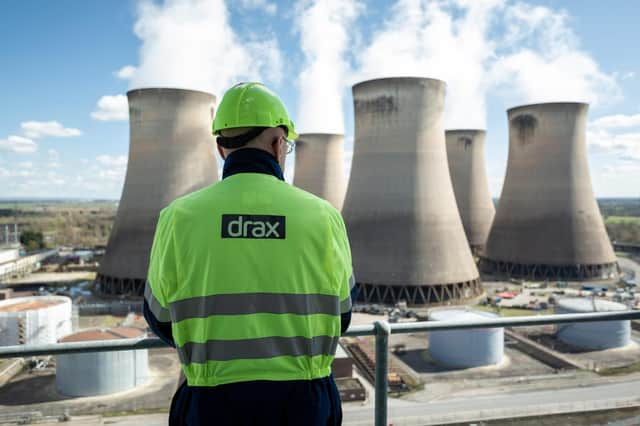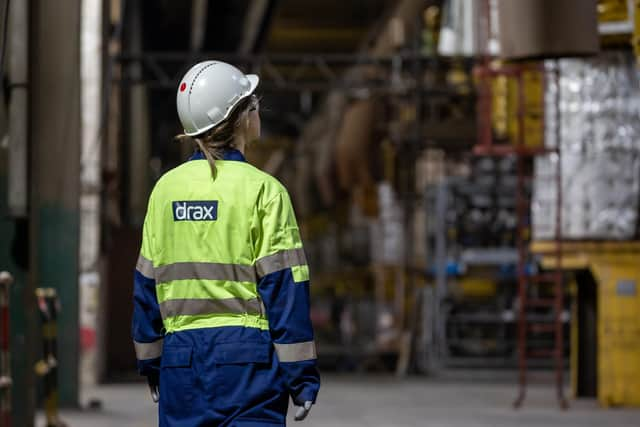Drax Power Station at 50 years - UK energy role 'more important than ever'


Richard Gwilliam, UK BECCS Programme Director at Drax Group, in this exclusive feature for The Yorkshire Post tells how 2024 is already shaping up to being one of the biggest years in the history of Drax Power Station.
Not only are we marking 50 years of generating power, supporting the UK’s energy security and investing in jobs and skills in Yorkshire, writes Mr Gwilliam.
But we are making crucial progress in securing the site’s long-term future as we develop our plans for converting two of our generating units to bioenergy with carbon capture and storage (BECCS) technology.
In the last few decades, we have delivered one of the big success stories in the UK’s quests to decarbonise by transforming Drax Power Station from Europe’s largest coal-fired power station to the country’s single-largest source of renewable electricity. The Selby site now produces around 4% of the UK’s electricity and 9% of its secure renewable power by output.
With our plans for BECCS we are writing the next chapter of the power station’s history. This would see Drax Power Station become the largest engineered carbon removal plant on the planet and play a crucial role in supporting the wider Humber region, the most carbon intensive area of the country, to reduce its emissions, continue to help underpin the UK’s energy security and support both local economies and employment by anchoring a carbon capture storage and utilisation (CCUS) cluster.
The consensus among climate scientists and policy makers is increasingly clear that, if the UK is to hit its legally binding Net Zero targets, then BECCS must be delivered at scale. It is no longer enough to prevent carbon dioxide from entering the atmosphere, we need to remove what is already there. The country’s Climate Change Committee say 53 million tonnes of removals from BECCS will be required each year by 2050.
When both BECCS units are fully operational, they will continue to provide renewable power to millions of homes and business and remove a combined 8 million tonnes of carbon dioxide from the atmosphere each year. In carbon terms, this is the equivalent of taking 3 million cars off the road or cancelling all departing flights from Heathrow.
That’s why we were pleased that we recently passed two critical milestones on the next phase of our journey toward delivering BECCS at the site.
This includes the Secretary of State for the Department of Energy Security and Net Zero, Claire Coutinho, granting planning approval for our BECCS plans and the UK Government launching a consultation on the development of transitional support for biomass generators to take them from the end of current renewable contracts in 2027 to BECCS operations starting.
The technology used to deploy BECCS is proven and recent Baringa analysis found that installing it at Drax Power Station could save the UK £15bn in whole economy costs between 2030 and 2050. That is because BECCS at Drax is the most efficient, cost effective and straightforward pathway to meet climate targets than other potential options.
For example, to achieve equivalent carbon savings to meet Net Zero without BECCS, the UK would need to commit to extensive alternative actions which could include amongst other things investment in synthetic natural gas production facilities costing £8.5bn; and committing to 735,000 more heat pumps beyond existing stretch targets, costing £5bn.
Subject to securing further policy support, we plan to invest billions to deliver our BECCS plans. This could deliver up to 10,000 high-skilled jobs in the region at the peak of the project’s construction as well as safeguarding 7,000 direct and supply chain jobs all helped by our ambition to source up to 80% of the materials and services we need to develop BECCS at Drax from British businesses.
Our plans have been built on years of consultation and engagement and we are steadily edging closer to putting shovels in the ground.


Despite the huge opportunity BECCS at Drax represents for the region and the UK, we have seen that organisations who are opposed to our plans are continuing to challenge them. For example, a piece of incorrect analysis on the costs of delivering the project was published and widely picked up by the media. This analysis misunderstood both the scale of the project, and the business models being developed by UK Government to support projects like ours – fundamentally mis-calculating project costs and ill informing readers.
Notwithstanding these challenges, we believe the pathway to deploying BECCS at scale is shaping up and will mean that Drax Power Station can continue to play a nationally important role well into the future.
When operational, BECCS will make a substantial contribution to fighting climate change and meeting Net Zero targets as well as delivering the jobs of the future for the Yorkshire’s young people and cementing the UK’s reputation as an epicentre of green technological innovation.
It would also ensure that as Drax Power Station moves beyond its fiftieth year, serves as a testimony to the engineering heritage of Yorkshire, charting the energy journey of the UK from fossil fuels, to renewable power and onwards to pioneer carbon removals.